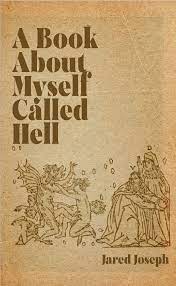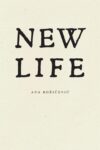
[Kernpunkt Press; 2022]
Last March of the Before Times, my partner and I packed a U-Haul and ventured toward a new life in Kansas City. It didn’t offer paradise but had better jobs, fresh faces, and adventure. This seemed like enough at the time. But on the trip, Major League Baseball officially canceled their season. A day after we arrived, the city and most of the country shut down. Our promised jobs no longer existed.
The adventure lengthened into a protracted period of emptiness, unfamiliar streets, and sheltering-in-place. We joked that we must have died on the drive. Our memories of the crash had been wiped out and our spirits continued the narrative into this eerie afterlife.
I’m pretty sure we all have a story of pandemic misery. The dragging existential crisis of boring apocalypse punctuated by moments of panic, near-misses, and death. People grew sourdough starters, learned quilting, fell into QAnon, and became radicalized to one side or the other. They grasped for anything to mitigate the meaningless hours, explain the irrational, or provide a second of reprieve.
The poet Jared Joseph turned to The Inferno, whose main character Dante gets a guided tour of hell — a once unrelatable story. From this comes A Book About Myself Called Hell — part retelling, part critique, and part authorial breakdown.
The Inferno isn’t required reading to enjoy the book but might be best for the reader who’s read Dante but has no intention of rereading him. Joseph spends a few pages summarizing the happenings of each canto while critiquing Dante as a character and author. But as COVID permeates and disintegrates everyone’s focus, it also breaks into Joseph’s, often in stream-of-consciousness musings of our hellscape in opposition to Dante’s.
These intrusive thoughts resonate with the universal experience of the shutdown. And they create the moments in the book that remained with me after I put it down. In one instance, while a verklempt Dante listens to one of the dead recalling her lover torn from her in her former life, Joseph interrupts to write, “i’m texting all my exes asking if they are alive, got virus’d.” Here is a sentiment easily read as an aside, but the conceit is artfully crafted to impress the image of Joseph putting the book down and picking up his phone.
Later, Joseph admits of one canto, “This one took two weeks to get through, i think i was depressed from sheltering in place, a big empty room or stanzone, the parks and beaches having been closed, bills and no money to pay them, my friend drinking herself halfway to death.” The effect of this lament recalls the desperation and failure to produce anything meaningful amidst the weight of a world paused in terror. Joseph conjures the dull grind of us rendered ineffectual, holed up with no escape, tortured by the toppling thoughts of personal and professional responsibility. It’s nice to know it wasn’t just me.
I lingered with empathy on the author’s troubles, but it was when Joseph critiques the moment Dante meets his mentor Brunetto that I fully realized Joseph identifies and wants us to identify with the residents of hell over Dante. In the retelling, Joseph praises Dante for crediting Brunetto as the man who taught him how to write. This is in accord with other scholars who say Dante lauds this man more than any other in hell. But Joseph digs into the fact that Dante the writer has not only written his mentor into hell but has done so for his homosexuality, a preference so reviled Dante cannot even name it. When Dante says he will make Brunetto immortal, Joseph cannot stomach anymore, writing: “And this here further bespeaks the strange cruelty of Dante, i don’t know if it’s intentio, if he’s an evil monster or a stupid beast, either way the result remains, that Dante the character claims to intend to do one thing — I will canonize you as a saint, I will retouch your tarnished memory burnished in gold — while Dante the author sends him to hell for loving men.” Sure, Dante’s era wasn’t open to a rainbow of sexuality, but even if that’s your argument, Dante trashing his mentor while painting himself as a hero is not a great look.
Throughout the book, Joseph ridicules Dante as aloof, judgmental, and deceitful to the dead, but he also reinterprets Dante’s graphic, brutal tortures of hell as not savage or painful but on infinite repeat. So those confined to hell seem more condemned to going through the motions than twisted with anguish. As Dante hoped to make each punishment representative for the sin, I found myself thinking of Ling Ma’s novel Severance, in which the infected zombie cycles through their everyday routines in a hellish pantomime of normalcy. But Ma’s infected are unaware of their sickness or the unraveled world, whereas Joseph sees Dante’s dead as much more pitiful because they retain their identities and awareness. Meanwhile, Dante prances through the small place in wonder at how this half lives. The tension between the characterizations of the dead and Dante works as the current that keeps Joseph’s recurring invectives about Dante afloat. That disparity enriches Joseph’s excoriation of Dante by revealing the base inequality of the poem. The damned are forever stuck in punishing routines, while Dante can leave once he reaches the exit. So Joseph, bitter and alone like the rest of us, paints Dante as a tourist vacationing amidst eternal suffering. The book might have been titled A Book About Hell Called Myself because in his vision, we are in the hellscape and Dante is anyone who has an out.
These themes are very serious, but the book is also funny. It’s filled with the grim, witty humor of a black-pilled Oscar Wilde with a Netflix addiction. Joseph continues the tradition of jampacking a text with allusions. Rather than being lofty, his references echo our own cultural touchstones of TV and pop. I read into the text a little implied derision of Dante’s. While I actually think The Wire is no more or less important than the Western Canon, it’s still funny to imagine how a Dante scholar might respond to that sentiment.
The book’s best moments are when the allusions are tongue in cheek and effectively illuminating. Often, they point to how Dante views himself or others, as when Joseph refers to Dante as Keanu Reeves playing Neo. This is comic in one sense because Dante believes himself to be “the one” writer who could tell this story, while in another because Dante the writer is essentially writing Dante the hero. These moments finger-gun toward Joseph’s larger point that we should remember the gleaming hero of The Inferno shares a name with the author.
But my favorite might be Joseph’s revelation that Dante is Michael Scott: “i realize the main character of ‘The Office’ is the main character of The Inferno, and Virgil is Dwight, they all simply worsen hell, and the revulsion the viewer or the reader feels towards the acts of Michael-Dante converts into a sort of divine comedy that, the more one reads Michael’s Inferno or Dante’s ‘Office,’ the more one realizes there is no change here, the way out of hell would be the way out of the show, so there must be more show, there must be more hell, and we are complicitly sub-authorizing hell’s existence and continuation . . .” Again, this is Dante as the picture of bumbling mediocrity proclaiming itself as valor, where Virgil is the pedant who sucks up to Dante while insulting him. This casts The Inferno as a situational comedy: just as in The Office the characters remain unchanged season after season, so Dante and Virgil exit each episode for the next without much thought or reflection.
Throughout the book, Joseph examines and blurs the lines between the writer and the character, most often lambasting Dante. Through this method, he reads himself and us. We hunger for more show or story, so more show and story are made even if the characters don’t. Our acts of reading or writing about the thing ensure its survival.
I hope this work will be an emotional time capsule holding all the fear and ennui specific to the past two years, but this period appears to be the start of an era rather than the end of anything. For now, it is the best kind of commiseration — funny, poignant, and honest enough to hurt.
Justin Burnell is a queer writer and bartender from East Tennessee. They’ve lived lives in New Orleans, New York, Iowa City, and now Kansas City. They’re still looking for the place they fit. Their work has appeared in Guernica, The Rumpus, Hotel, and The Columbia Review.
This post may contain affiliate links.







